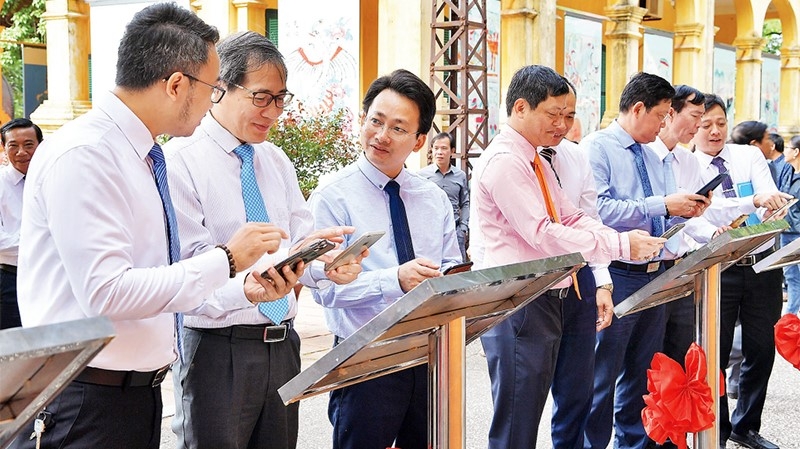With the development of technology, tourists are the ones who benefited the most when they are provided with many different conveniences and experiences. In addition to the efforts of the Hanoi Department of Tourism, many districts in the capital have also deployed the construction of technological applications such as QR code design, 360 software and tourism management software.

Using QR code to look up information at the Imperial Citadel of Thang Long.
The One Pillar Pagoda in Ba Dinh district has just been affixed with a QR code to help visitors to find out information conveniently when visiting the monument. The QR code board is located at the entrance to help guests easily identify them. Visitors only need a smartphone with software to read QR codes or install applications that read QR codes (such as Zalo). When visitors turn on the app and hold it up in front of the code board, their smartphone will immediately jump to the link to introduce the relic on the website of Ba Dinh district. From the website, visitors can access many information about monuments, landmarks, and other tourist destinations in the district. The QR code attachment is a part of the project "Application of information technology in tourism promotion in Ba Dinh district" implemented by the Youth Union of Ba Dinh district in coordination with the District's Office of Culture and Information that aims to digitize information of ranked historical sites in the area. Deputy Secretary of Youth Union of Ba Dinh District, Nguyen Thanh Phuong said “Currently, we have attached QR codes at important relics such as the Imperial Citadel of Thang Long, the One Pillar Pagoda, Voi Phuc (Kneeling Elephant) Temple, and the Flag Tower of Hanoi. By the end of 2020, they will attach QR codes to 30 monuments in the area. Along with attaching codes, the information on monuments and tourism destinations is implemented by the District's Office of Culture and Information. The design of QR code is also implemented by youth union members.”. It is expected that the attachment of the new QR code is the beginning of the more widely deployed smart applications that Ba Dinh district will deploy in the near future. Specifically, Ba Dinh district will has specialized travel introduction page accompany with the facilities of hotel booking, food service, entertainment, travel for easy information search and discovery.
Like Ba Dinh district, the Youth Union of Tay Ho district deployed QR codes for monuments when implementing the project "Application of information technology in propaganda and promotion on Tay Ho tourism". Up to now, all 39 ranked monuments in the district have been tagged with QR codes. The historic site and cultural monuments at the information portal of Tay Ho district is updated to provide more interesting information about monuments and tourism destinations in the area. After attaching a QR code, the historic site of the district significantly increased accessing. Many visitors to relics such as Kim Lien pagoda, Tran Quoc pagoda, and Phu Tay Ho (Tay Ho Temple) used their phone to get more information.
Promoting the application of technology and developing smart tourism is a common trend of the tourism industry in recent years. In recent years, the Hanoi Tourism Department, monuments and tourism destinations have implemented many technology application activities in tourism introduction, promotion and management such as building applications, websites, and attaching QR code to introduce tourist destinations or help guests book travel services.
The Covid-19 pandemic is causing visitors to tend to travel in small groups or as individuals, and self-discovery, therefore, many localities have launched smart gadgets. One of the localities to carry out the promotion and introduction of culture and tourism is Dong Da District. In recent times, Dong Da District has implemented the project "Digitalizing data, building a 360° interactive system to promote cultural heritage and tourism in Dong Da District".
The project includes: Developing a set of communication publications to introduce Dong Da District; digitizing historical, cultural destinations and tourist sites in Dong Da District with 360° image technology; building a Dong Da 360° information and application site; setting up smart electronic information stations for looking up tourism in Dong Da District; and building a Dong Da 360° virtual travel assistant system. In particular, the Dong Da 360° website and interactive application (www.dongda360.vn) that has been in operation since July 2020 is a data storage system for historical, cultural and digitalised travel destinations. Accessing this website, from anywhere in the world, the guests can experience the relics and landscapes in the district such as Van Mieu - Quoc Tu Giam (Temple of Literature), Go Dong Da (Dong Da Mound), and Lang Pagoda in virtual space. With the use of 360 image technology, combining 2D video clips and photos, users will be experienced a lot of interesting information. Notably, in order to effectively support tourists, the website also offers suggestions and guides for guests about the hotel system, restaurants, and local specialties. The information is connected with many websites providing other travel facilities, so just using a computer or smartphone, customers can book many travel services such as accommodation, entertainment and travel online. The information site also guides visitors to make short tours in the city, providing tourist maps to locate visitors, with surrounding tourist facilities. According to Head of Dong Da District’s Office of Culture and Information Nguyen Trong Hai, in the coming time, the website will continue to be completed in content and form of expression to contribute to local socio-economic development.
Digitalising tourism is an inevitable trend. Currently, more and more attractions, localities and businesses are applying technology to tourism. However, according to the Deputy Director of the Hanoi Department of Tourism Tran Trung Hieu, units should improve linkage, technology sharing, and synchronous investment in technical infrastructure towards more efficient application of technology in tourism.